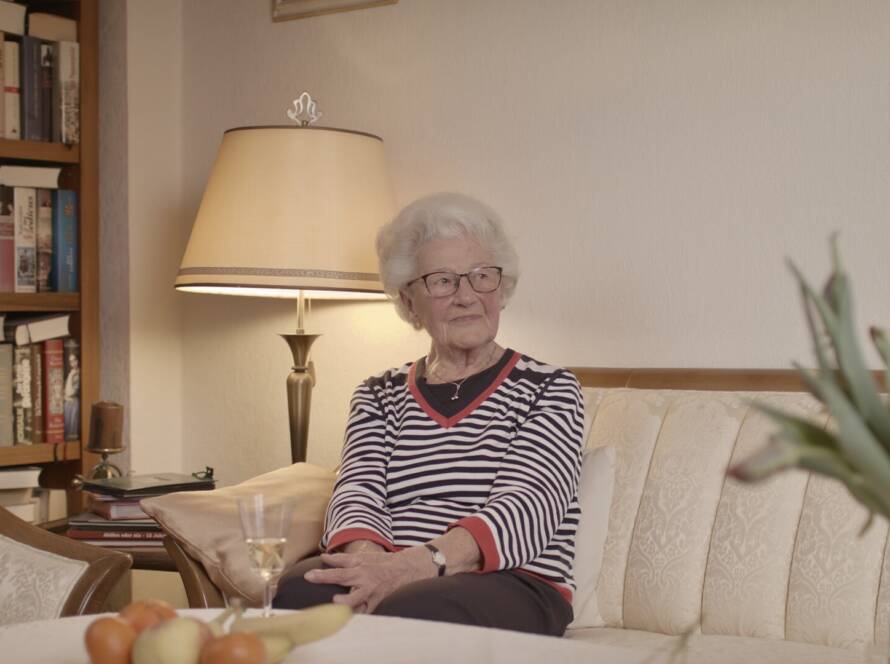The Girl From Salonika is the story of Mazaltov Behar, “Fofo”. A documentary about intergenerational trauma, survival and living.
“I think I resisted because I had a happy childhood”.
(“Creo que resistí porque tuve una infancia feliz”).
THE GIRL FROM SALONIKA is the story of Mazaltov ‘Fofo’ Behar, a 17 year old Greek girl who was deported to Auschwitz-Birkenau and a victim of Nazi sterilization experiments at the hands of Nazi doctor Horst Schumann. We revisit her early years in Greece and the political and social climate before the German invasion and deportation of 90% of Greek Jews. The Girl From Salonika features never before seen footage shot inside Block 10 and Fofo’s testimony. As one of the few survivors of Block 10, Fofo reclaimed her maiden name, her voice and began working with doctors and university professors towards the end of her life. She raised awareness on the importance of medical ethics, dangerous ideologies and what happens when doctors in particular lose their humanity. We look at the effects of international trauma via her son David and grandson Carlos, a psychologist who journeys to Auschwitz to learn more about his grandmother. Fofo made her Sephardi exodus back to Spain, married another Greek Holocaust survivor and lived a full and generous life. Her message resonates with young and old, and importantly conveys a message to all of our future medical professionals.

Director Biography – Alison Jayne Wilson
Alison is an Australian filmmaker, writer, activist and political scientist based in Spain. She has worked in the NFP sector for 15 years as a communications strategist and in teams nominated for human rights awards. She made the move over to documentary film seven years ago after studying film in London & Spain. Her last feature length documentary film EXIT played at the San Diego International Film Festival (2022) and has screened across Europe and in the US.

She has been an invited filmmaker panelist at the Cambridge Symposium on Human Trafficking (UK) and CESE (USA) summit on human trafficking and exploitation. She works with several governmental equality departments to have the film shown in schools, youth centres as well as in cinema. She believes documentary films can highlight injustices, spark change and are often invaluable educational tools which leave lasting impacts on their audience. Her current film The Girl From Salonika was completed January 2024, and Alison is a CLAIMS (USA) conference film grant recipient.
Director Statement
Director’s Statement
My interest in telling this story goes back to my childhood. From witnessing my parents bring home new friends who were having a ‘tough time’. This could have been one of my dad’s World War II veteran friends resting in our sunroom (I learnt later on in life they were all suffering from PTSD and there was little to none social support in place). My mother assisted the vast number of refugees arriving often alone and with little resources to find decent employment and housing, and to restore dignity where she could. I was already familiar with World War II as my father served in the Australian army. But I didn’t learn about the Holocaust or the Shoah until my mother explained to me about our neighbour Zelda. I remember Zelda’s blue eyes, clear and blue but terribly sad. My Mum told me in a simple way, a terrifying story that was actually real.
This is not unlike Carlos Mordoh’s first learnings of the Holocaust the main protagonist in The Girl From Salonika. He was around 8 too, when his grandmother began slowly explaining her story to him.
“I was 8 or 9 years old when my grandmother explained to me in an incomplete and disorderly way, little by little my paternal grandmother explained to me her passage through that hell”.
And now we have found each other in Barcelona, Spain. I am extremely grateful to have been a recipient of a CLAIMS filmmaking grant and equally the trust given to me from the Mordoh-Monforte family to bring Fofo’s important story to life. I believe in the importance of education and memory and I hope for this film to be an educational tool. With the presence of far right groups in many nations, holocaust denial and rising antisemitism, it is an important time to make this film.
Interview




| Alison Jayne Wilson Writer, Director, Producer EXIT |



